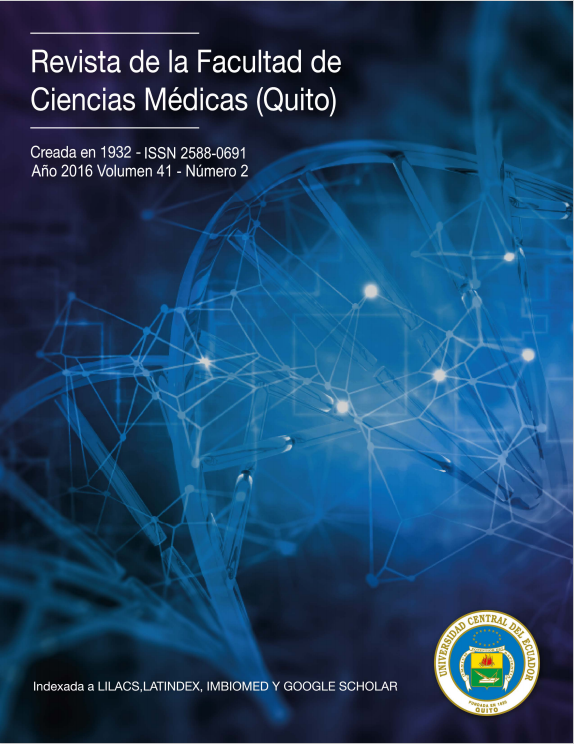Síndrome de Bardet Biedl: rara causa de enfermedad renal terminal
Keywords:
Bardet Biedl syndrome, ciliopathies, chronic kidney disease, hemodialysisAbstract
Bardet Biedl syndrome (SBB) is a rare genetic disorder; its prevalence in North America and Europe is estimated at 1: 140,000 to 1: 160,000 newborns. It is included in the group of ciliopathies as it results from at least 16 different gene mutations suspected of playing a fundamental role in the cilia involved in cell movement and perception of sensory stimuli. It is characterized by retinitis pigmentosa, polydactyly, central obesity, and kidney damage, with kidney failure being the leading cause of death. It shows a Bardet Biedl Syndrome case with chronic kidney disease that affects a 21-year-old male patient treated at the Nephrology Department of the Eugenio Espejo Hospital. The patient required renal replacement therapy (hemodialysis). It notes that kidney malformations are common in this genetic disorder; however, it occasionally reports chronic kidney disease as a characteristic of the syndrome.
Downloads
Metrics
References
Forsythe E, Beales PL. Bardet-Biedl syndrome. Eur J Hum Genet 2013; 21:8-13.
Cardenas-Rodriguez M, Irigoín F, Osborn DP, Gascue C, Katsanis N, Beales PL, et al. The Bardet-Biedl
syndrome-related protein CCDC28B modulates mTORC2 function and interacts with SIN1 to control cilia length independently of the mTOR complex. Hum Mol Genet 2013; 22:4031-42.
Ashkinadze E, Rosen T, Brooks SS, Katsanis N, Davis EE. Combining fetal sonography with genetic
and allele pathogenicity studies to secure a neonatal diagnosis of Bardet-Biedl syndrome. Clin Genet
; 83:553-9.
Croft JB, Swift M. Obesity, hypertension and renal disease in relatives of Bardet-Biedl syndrome sibs.
Am J Med Genet 1990; 36:37-42.
Rathi M, Ganguli A, Singh SK, Kohli HS, Gupta KL, Sakhuja V, et al. Bardet–Biedl syndrome with
end-stage kidney disease. Indian J Nephrol 2007; 17:10–3.
Noorden G, Friman S, Frisenette-Fich C, Persson H, Karlberg I. Renal transplantation in the Bardet-Biedl syndrome, a form of Laurence-Moon-Biedl syndrome. Nephrol Dial Transplant.
Langer RM, Földes K, Szalay L, Jaray J. Laurence-Moon-Bardet, Biedl syndrome for kidney transplantation at the age of 57 years. Transplant Proc 2005; 37:4223–4.
Hooda AK, Karan SC, Bishnoi JS, Nandwani A, Sinha T. Renal transplant in a child with Bardet–Biedl
syndrome: a rare cause of end-stage renal disease. Indian J Nephrol 2009; 19:112–4.
Imhoff O, Marion V, Stoetzel C, et al. Bardet-Biedl syndrome: a study of the renal and cardiovascular phenotypes in a French cohort. Clinical Journal of the American Society of Nephrology 2011;
(1):22–29.
Mockel A, Perdomo Y, Stutzmann F, Letsch J, Marion V, Dollfus H. Retinal dystrophy in Bardet-Biedl
syndrome and related syndrome ciliopathies. Progress in Retinal and Eye Research 2011; 30(4):258–274.
Bujakowska KM, Zhang Q, Siemiatkowska AM, Liu Q. Mutations in IFT172 cause isolated retinal
degeneration and Bardet-Biedl syndrome. Hum Mol Genet 2015; 24(1):230-42.
Hernandez-Hernandez V; Pravincumar P; Diaz-Font A, May-Simera H, Jenkins D, Knight M, Beales
PL. Bardet-Biedl syndrome proteins control the cilia length through regulation of actin polymerization Hum Mol Genet 2013; 22(19):3858-68.
Ashkinadze E, Rosen T, Brooks SS, Katsanis N, Davis EE. Combining fetal sonography with genetic
and allele pathogenicity studies to secure a neonatal diagnosis of Bardet-Biedl syndrome. Clin Genet
; 83(6):553-9.
Downloads
Published
How to Cite
Issue
Section
License
Copyright (c) 2016 Jorge Oswaldo Quinchuela Hidalgo, Mercedes Nájera, Franklin Calispa, Oswaldo Alcocer, Jorge Chonata

This work is licensed under a Creative Commons Attribution-NonCommercial-NoDerivatives 4.0 International License.











